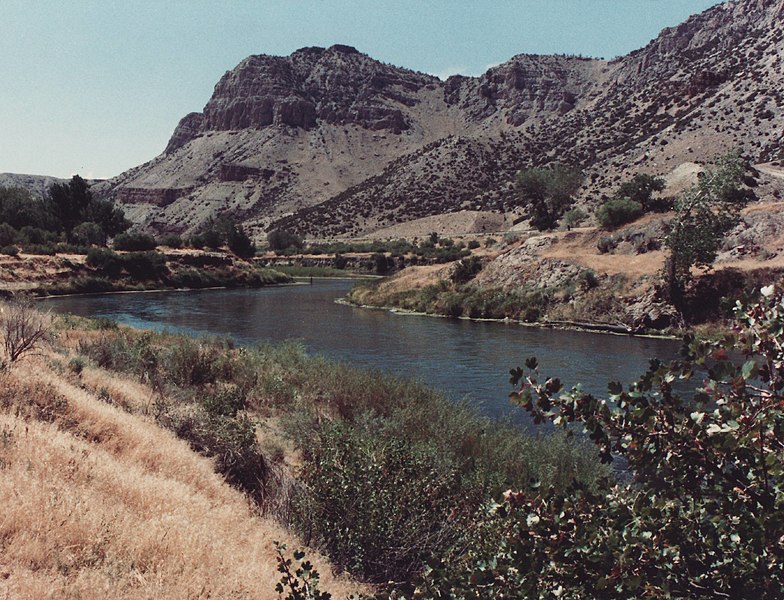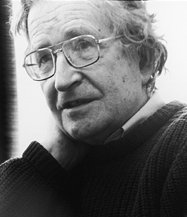 | ||
| The Wind River at the Wind River Indian Reservation, Wyoming via James G. Howes / Wikipedia |
Two articles caught my eye this morning. One is from Indian Country Today Media Network, a trans-national news site that views the world through First Nations eyes, and the other is on AlterNet, and is an edited version of a talk given by Noam Chomsky.
The ICTMN article begins:
The two main irrigation systems on the Wind River Indian Reservation could hardly be more different. The Bureau of Indian Affairs manages one, a sprawling network of canals running south and east of the Washakie Reservoir and the Little Wind River. Local water users run the other, a smaller system in Crowheart (population 141) between Fort Washakie and Dubois. Much of the system that the BIA directly controls ran dry over the summer. The system that local users run—on paper they are contractors working for the BIA—will deliver water until the irrigation season ended in early October.The larger of the two irrigation systems runs out of water about halfway through the season. The other does not. The first system is managed by the Bureau of Indian Affairs (BIA), the second by two users groups working in concert.
It's tempting to simply label the poor management of the larger irrigation system as one of those situations where government bureaucracy is simply incapable of managing anything, is wasteful and terrible and shouldn't be allowed to exist. This is the common narrative we here in Canada and the US--particularly from the conservative right. As a conservative leftist, I have a certain belief in the utility of government--particularly in reigning in the excesses of the sociopathic 1%--but I tend to think that the problem behind the poor management by the BIA is not innate incompetence, but rather a lack of democracy. It doesn't help that the BIA has a history that roughly parallels that of the Canadian Department of Indian Affairs, where the goal is to "drive the Indian out of the man"; that is, to destroy First Nations culture and society and replace it with that of the colonizing power. So BIA faces a fair bit of suspicion when as the article contines:
“This board directed BIA and Mr. Allen to not do what you just did,” Robinson told Allen and his superiors, John Anevski and Ed Parisian of the BIA regional office in Billings. “That is, drain the dam and let Ray Lake continue to run so that all of those non-Indian farmers down at Arapahoe can continue to irrigate while all the tribal farmers have no water.”The contrast with the smaller Crowheart irrigation system is marked.
The Crowheart system is open. Users talk among themselves about how to push enough water to everybody’s fields. Headgates are not padlocked. Water users make collective decisions about who gets how much water and when. Irrigators open and close their own headgates. The board encourages everyone to think about water for their neighbors downstream in addition to water they need themselves. “The moment you think about your own water and not everybody’s water, you’ve lost the battle,” said Lyle Alexander, head of the Crowheart Bench Water Users Association. “The moment you put a padlock on the system, you’ve lost.”
For the most part, users hold practical, civil discussions at those meetings. If a user goes rogue and insists on more than his share of the water, the local board can lock his headgate. But by all accounts this happens only rarely—not least because everyone usually has enough water.Putting aside questions about water use and irrigation on the Great Plains, what we're seeing in the Crowheart system is small scale democracy at work. And it takes looking outsid eyour own narrow interests. As Tim Schell, one of the founders of the Crowheart water users association put it: “I used lots of water, but then I shut it off. If I get more water, I have to make sure that everybody else on the canal gets as much or more water than me.”
“The best way to handle an issue is to put it in the hands of the irrigators,” Alexander said. “Water users know more about their land and water than the BIA.”
I love that-- "I have to make sure that everybody else on the canal gets as much or more water than me." According to neo-liberal economic theory, this water is a commons, and as such should be quickly destroyed because of each farmer looking to put his or her own interests first. The "tragedy of the commons" is that by putting their own interests first ("beggar thy neighbour") the carrying capacity of the commonly used resource should be quickly overrun and the resource destroyed. But contrary to the theory, commons, like the Crowheart irrigation system, are managed well, by everyone taking the position that if we think of the needs of the others--and value those needs as much or more than our own--we can maximize the collective without destroying the commons.
td class="tr-caption" style="text-align: center;">The Wind River at the Wind River Indian Reservation, Wyoming
via James G. Howes / Wikipedia
 | ||
| Noam Chomsky via Wikipedia |
Noam Chomsky puts it: "Concern for the common good should impel us to find ways to cultivate human development in its richest diversity." Chomsky links this to the ideal of anarcho-syndicalism. To quote Wikipedia: "Syndicalists consider their economic theories a strategy for facilitating worker self-activity and as an alternative co-operative economic system with democratic values and production centered on meeting human needs."
Neo-liberal capitalism doesn't center on human needs, rather it follows its own self-destructive logic of perpetual growth and increasing consumption. Chomsky points out that anarcho-sydicalism "doesn't depict "a fixed, self-enclosed social system" with a definite answer to all the multifarious questions and problems of human life, but rather a trend in human development that strives to attain Enlightenment ideals." And that "this broad tendency in human development seeks to identify structures of hierarchy, authority and domination that constrain human development, and then subject them to a very reasonable challenge: Justify yourself."
What do we want in a better world? A food secure world? Farms that don't actively destroy the commons which they depend upon. Our current industrial farms do exactly that, being significant contributors to global greenhouse gas emissions.
We want a form of agriculture that values the farmer and farm labourer, helping each to achieve both the respect and income necessary to encourage sustainable, long-term agriculture.
We want an agriculture and food system that feeds everyone a healthy diet with minimal waste--and what waste there is should be recycled back into the food system instead of contributing to global greenhouse gas production. The modern, capitalist, industrial food system does not do this. Waste is paid for in the price of food, and then ignored, or shunted off to the desperate and the poor.
The food system as currently constituted is driven by the needs of capital, not by the needs of those who eat, and that makes its impact on the environment a problem. Perhaps it is about time to give sustainable a try, to see if we can't make a go of a more co-operative, steady-state economic system that values human needs over the needs of capital.
No comments:
Post a Comment